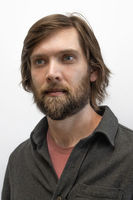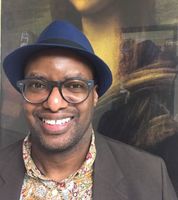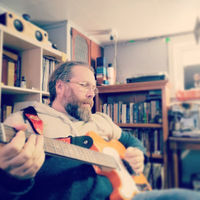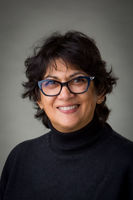"I Recall, Reimagine, Contemplate" The Word on the Street Guest Authors Andrew Faulkner, Michael Fraser, D.A. Lockhart, & Shani Mootoo
The Word on the Street is a literary festival that features over 150 writers and speakers participating in readings, interviews, panels, workshops, book signings, and more. With children's programming, book and magazine sales, food trucks, and even a beer garden this year, it's a full-on literary street festival in the truest sense. This year represents a homecoming, both as the festival returns to in-person programming for the first time since 2019, and also as it moves back to its previous—and widely beloved—location at Queen's Park in Toronto for two fulls days of programming on June 11 and 12.
We got to speak to four of the talented authors appearing this year: Andrew Faulker, author of Heady Bloom (Coach House Books); Michael Fraser, author of The Day-Breakers (Biblioasis); D.A. Lockhart, author of Go Down Odawa Way (Kegedonce Press); and Shani Mootoo, author of Cane | Fire (Book*hug Press).
You can catch Michael and Daniel at Poetics of North America at 10:00am on June 12, and Andrew and Shani at Life's Poetic Turns at 4:00pm, also on June 12.
The writers tell us about what they'll be reading at The Word on the Street, about favourite Ontario authors, and about the spots, whether well known or off the beaten path, that inspire them.
Open Book:
Tell us about the book you're featuring at The Word on the Street this year.
Andrew Faulkner:
My new collection of poems, Heady Bloom, is a book about having a headache, and about navigating the intersection of symptoms and self. It’s a poem in dialogue with different parts of identity. During the later parts of editing the book for publication, I found myself thinking of the poems as talking aloud to oneself while pacing a stage, like fragmented pieces of a monologue. Which is a long way of saying: I’m looking forward to bringing it in front of an audience.
Michael Fraser:
The Day-Breakers is an homage to African Canadians who fought in the American Civil War, it chronicles their experiences, struggles, triumphs, and of course, it’s all presented through a poetic lens. I utilize Civil War era slang and terminology to achieve this chronicling and retelling. The unique lexicon immediately immerses readers in this poetically-vivid and resurrected world. Luke Hathaway’s blurb nails it: “In The Day-Breakers, poet Michael Fraser imagines the selflessness of Black soldiers who fought for the Union during the American Civil War, of whom hundreds were African-Canadian, fighting for the freedom of their brethren and the dawning of a new day. Brilliantly capturing the rhythms of their voices and the era in which they lived and fought, Fraser’s The Day-Breakers is an homage to their sacrifice and an unforgettable act of reclamation: the restoration of a language and a lived experience, and a powerful new perspective on Black history and experience.”
D.A. Lockhart:
Go Down Odawa Way is a decolonial act of lyric love for the region that I call home. The poems focus on Waawiiyaatanong and the southern stretches of the Three-Fires Confederacy. It spans settler borders, including the contemporary settler communities of Metro Detroit, MI, Lansing, MI, and Windsor, ON. Working from the roots up, the collection challenges the dominant colonial narratives offered by “history” and popular culture. Here you see the contemporary Indigenous psyche moving through the cities and spaces of the region through the viewpoint of a Lenape speaker. And the Unami dialect of Lenape is utilized throughout to reclaim the Indigenous essence of the region. From Detroit Pistons’ Bad Boys to late-night cruises to the edges of the territory to decolonial sonnets for the areas lesser know creeks and streams this is the testimony of an Indigenous spirit and people that not only has refused to die, but has flourished despite everything in an environment that has long been forgotten in terms of its Indigenous soul.
Shani Mootoo:
I will be presenting my latest book, Cane | Fire, a collection of poetry combined with my artwork. This body of work is a reflection on important moments, stages, throughout my life. It is, therefore, a sort of memoir in poetry form. Being a storyteller, I shape, highlight and shade what I tell, and do what art can allow for: I recall, reimagine, contemplate history and the self, honouring all the truths, hopes, desires, the failures and the celebrations.
Open Book:
This year the festival will be returning to Queen’s Park. How do you feel about the new location and what effect does it have on your performance planning?
AF:
I love Word on the Street wherever it takes place. But I really love Word on the Street at Queen’s Park. The pace is slower. There’s something poetic about quietly seizing a place for literature at the heart of the city. But it doesn’t affect how I’ll prepare, as I always do, with anticipation and the hand-wringing hope that I can do right by the book, by my co-presenters, and by attendees.
MF:
I’m very pleased with Queen’s Park as the location. The first time I featured at Word on the Street was also at Queen’s Park, thus, it’s wonderful to return to this location many years later. I think Queen’s Park is preferable since it’s easier to access by both public transit and cars. The times I attended Word on the Street at Harbourfront, as both featured reader and spectator, were also fantastic. However, Queen’s Quay seemed somewhat congested. At day’s end, I’m thrilled Word on the Street has resumed and is an actual live, in-person event! I’m easy to please. I’d be thrilled if it was held in any nondescript alleyway or flea market parking lot at this point. Whenever and wherever people meet to share, discuss, and immerse themselves in books is a positive experience and an unvarnished success for everyone involved!
Your CanLit News
Subscribe to Open Book’s newsletter to get local book events, literary content, writing tips, and more in your inbox
DL:
I would like to think that the seat of the provincial capital is something of a seat of public discourse. That the park in the centre of the city is known as a place where people from all over the province come to debate and set courses for our collective future makes the choice of location natural. Land holds medicine and the medicine of the land beneath Queen’s Park is one given sharing, listening, and engaging with the richness of voices from across the province. And literature and art for all generations is something that needs to be celebrated and fed on that land. In this way a return to Queen’s Park is a potential act of healing. And what is more than apparent is the critical need we all have for healing after multiple years of pandemic and a very visible backward slide in civic discourse. The streets and spaces around the park are meant for peaceful and positive engagement between people. To hear poetics, stories, and literature shared rather than truck horns and hateful rhetoric will be such an essential move forward. It will be a return to the initial essence of Queen’s Park.
SM:
The Park has always been a great gathering place for this festival of writing and reading. I look forward to the general feeling of community and worth that such a festival affords a writer—all of us getting together, moving from tent to tent, myriad booksellers peddling our wares, the sticky food on offer. It’s an unusual and wonderful celebration of literacy in its several forms.
Open Book:
The Vibrant Voices program at The Word on the Street celebrates Ontario authored and published books. Can you tell us about a favourite book by an Ontario-based author that you've read?
AF:
It wouldn’t feel quite right for me tell you how much I loved two recent essay collections that I edited—The Only Way Is the Steady Way, an amazing meditation on baseball, and Send Me Into the Woods Alone, a hilarious and intimate look at motherhood—so I won’t.
Instead I’ll say that in twenty years we might recognize Days by Moonlight as Andre Alexis’s best book, and one of the most telling portraits of small-town Ontario and that Karen Solie’s The Caiplie Caves is the work of a tremendous poet at the height of her power.
MF:
Yes! Everyone should read Dancing After TEN which is a graphic memoir by Vivian Chong and Georgia Webber. It’s the heartbreaking story of how Vivian Chong lost her eyesight. I’m still dumbfounded and filled with multiple emotions whenever I contemplate her story and how she responded to her ill fortune. It’s truly an unbelievable story. Hollywood could easily create an Oscar-winner with this story.
DL:
Recently, I’ve really been enjoying Randy Boyagoda’s Dante’s Indiana. Love the whole mix of mythology and humour and the familiar haunts of small-town Indiana. On the poetry side of things, I’ve returned to Laurence Hutchman’s Swimming Toward the Sun: Collected Poems 1968-2020. Hutchman’s work has a strong sense of him as an individual and to feel out and experience that individual and the world he inhabits through his poems is a real pleasure and a guide post for how a poet and move through their career in this country.
SM:
I have just finished reading Toronto author Shyam Selvadurai’s utterly compelling Mansions of the Moon. I was most impressed by how vividly, how believably he painted the world of north India/Nepal of 600BCE, and the beginnings of Buddhism as revealed by Siddhartha Gautama. And particularly how he was able to show the effect Siddhartha’s abandonment, in his quest for enlightenment, had on his wife Yasodhara, their son and the kingdom he had once been slated to inherit. Selvadurai’s accomplishment here was on par with Mary Renault’s in her Alexander Trilogy.
Open Book:
Is there a place in Ontario that has been inspiring or special to you? If so, what do you love about it?
AF:
Doctors’ offices. Hospitals. Waiting rooms. Some of the poems in Heady Bloom contend with the ambiguity and attendant anxiety of uncertain medical conditions and outcomes. What does it mean to be in an uncertain state of sickness? What does it mean to be uncertain about your own definitive state of sickness? The poems echo around medical infrastructure, and while I don’t exactly love those places, they’re certainly inspiring in an odd way.
And before the poems were written, I myself was unwell—I had chronic headaches for years—and it is near impossible to write when you’re sick. If it weren’t for the services funded by public health care, I couldn’t have written the book. I am ever grateful to the people who make health care happen, and to the waiting rooms in medical facilities that in a thousand ways make clear to everyone who passes time in them: this is a between space, and you and your symptoms are going somewhere. But where? Hang around a little longer and you might find out.
MF:
Yes, the Vaughan Road neighbourhood in west-central Toronto is my most inspiring and special place in Ontario. I grew up in that area and attended high school at Vaughan Road C.I., which is now defunct. Thus, most of my “coming-of-age” moments are specifically tied to the area. Certain parts of the vicinity are heavily gentrified now, however, the main thoroughfare still retains its original working-class grit. The area is also culturally dynamic and multifaceted on various levels. Where else can a teenager adeptly use profanity and salutations in Jamaican, Italian, Portuguese, Greek, and Trinidadian English without missing a beat? My brother and I could hear two people speaking Portuguese and based on the cadence and lilt, we’d easily identify if they were from Brazil, Cape Verde, or Portugal. It would be instantaneous. One naturally developed a heightened ear for language in such a rich linguistic environment. I can’t think of a more quintessentially Toronto neighbourhood.
DL:
I’ve actually just returned from a residency at the Al Purdy A-Frame in Ameliasburg. Over the course of the month both myself and my family were completely taken with the beauty and great medicine of Prince Edward County. The wide swaths of lilacs, clear lake waters, the flutter of American goldfinches. There is a great literary tradition there with so much of Purdy’s work generated from Roblin Lake outward. I often argue that true Canadian literature starts with Purdy’s work. Because it is rooted in what is often quintessential Canadian landscape and experience, it rings true in a way that so much poetic work doesn’t, even today. And to that extent, Ameliaburg and Prince Edward County is a shrine to all of Canadian literature and experience. We start imagining ourselves as a people of a land in a place like that. From the broad rolling hills and farmland to the cascading sand dunes and the trill of migrating birds there is so much that speaks to our relationship with the land and to each other. While it is a unique landscape in a big country of unique landscapes, it does act like a spark.
SM:
I am fortunate to live in a place I love: Prince Edward County, in southeast Ontario. The County is the traditional land inhabited by the Anishnaabeg, Wendat, and Haudenosaunee Peoples. On one end of the County, the approach to the bridge that takes you onto the island of Prince Edward, is through the beautiful farmlands and vibrant business community of the Mohawk Peoples of Tyendinaga.
The landscape of the County feeds me spiritually; just the other day I watched a deer take its time nosing through our backyard, checking out the new spring growth on the shrubs and trees. I have written four books here, while looking out onto a landscape of seasonal birds, the orioles, grosbeaks, a variety of the most beautiful woodpeckers, house wrens, finches, and a pair of cardinals I think I can be bold enough to call our own. When we go out to feed them, the chickadees fly in and perch just feet away, and I swear they whistle thanks. The beaches in good weather don’t belong to us anymore, as they have been taken over by tourists, but the inland trails and parks, the country roads that are great for walking and bicycling, and our community of close-knit friends, are heaven at hand.
________________________________________________
Andrew Faulkner is the author of one book of poetry, Need Machine, and several chapbooks, one of which was shortlisted for the bpNichol Chapbook Award. He has an MFA from the University of Guelph and lives in Picton, Ontario, where he works as the managing editor of Invisible Publishing.
Michael Fraser is published in various national and international journals and anthologies. He is published in Best Canadian Poetry in English 2013 and 2018. He has won numerous awards, including Freefall Magazine’s 2014 and 2015 poetry contests, the 2016 CBC Poetry Prize, and the 2018 Gwendolyn Macewen Poetry Competition. The Day-Breakers is his third book of poems.
D.A. Lockhart is the author of seven collections of poetry, including Devil in the Woods (Brick Books 2019) and Tukhone: Where the River Narrows and the Shores Bend (Black Moss Press 2020). His work has appeared in Best Canadian Poetry in English 2019, TriQuarterly, ARC Poetry Magazine, Grain, Belt, and the Malahat Review among many. He is a Turtle Clan member of Eelünaapéewi Lahkéewiit (Lenape), a registered member of the Moravian of the Thames First Nation, and currently resides at the south shore of Waawiiyaatanong (Windsor,ON-Detroit, MI) and Pelee Island.
Shani Mootoo was born in Ireland, grew up in Trinidad, and lives in Canada. She holds an MA in English from the University of Guelph, writes fiction and poetry, and is a visual artist whose work has been exhibited locally and internationally. Mootoo’s critically acclaimed novels include Polar Vortex, Moving Forward Sideways Like a Crab, Valmiki’s Daughter, He Drown She in the Sea, and Cereus Blooms at Night. She is a recipient of the K.M. Hunter Arts Award, a Chalmers Fellowship Award, and the James Duggins Outstanding Midcareer Novelist Award. Her poetry has appeared in numerous journals and anthologies, and includes the collection, The Predicament of Or. In 2021 Mootoo was awarded an honorary Doctorate of Letters from Western University. Her work has been long- and shortlisted for the Scotiabank Giller Prize, the Dublin IMPAC Award, and the Booker Prize. She lives in Prince Edward County, Ontario.








